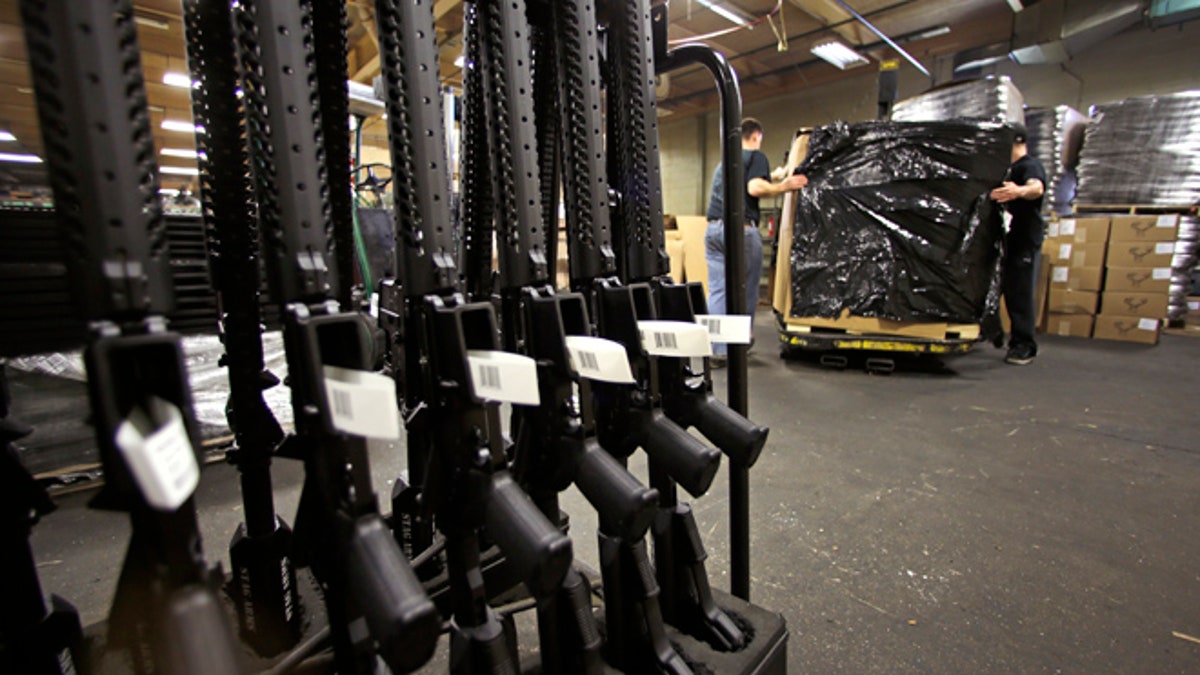
April 10, 2013: A rack of AR-15 rifles stand to be individually packaged as workers move a pallet of rifles for shipment at the Stag Arms company in New Britain, Conn. (AP)
HARTFORD, Conn. – A group of Connecticut organizations that support gun rights, pistol permit holders and gun sellers filed a lawsuit in federal court Wednesday against Gov. Dannel P. Malloy and other state officials, arguing the state's new gun control law violates their constitutional rights.
The plaintiffs are seeking a federal court injunction to stop the law from being enforced.
Wednesday's suit comes more than a month after Malloy signed into law a wide-ranging gun control package that extends the state's assault weapons ban to more guns, bans large-capacity magazines and expands background check requirements. Considered one of the toughest laws in the country, it was a response to the Dec. 14 massacre at Sandy Hook Elementary School.
Lead attorney Brian Stapleton said the plaintiffs' core complaint is that the assault weapons and large-capacity magazine bans violate their rights to bear arms and to equal protection under the law. Stapleton, a partner with Goldberg Segalla LLP, with offices in Hartford, New York and elsewhere, is also the lead trial counsel in the challenge of New York's new "Safe Act" gun control law.
The plaintiffs in the Connecticut lawsuit, filed in U.S. District Court in Bridgeport, include the Coalition of Connecticut Sportsmen, the Connecticut Citizens Defense League, gun retailers in Monroe and Norwalk, and various gun permit holders ranging from a rabbi in Fairfield to an 80-year-old widow living in Hartland.
"We wanted to include in our complaint a wide variety of plaintiffs to demonstrate the broad impact of this law," Stapleton said. "This is a law that negatively impacts private individuals — regular, ordinary citizens — it affects manufacturers and retailers. It affects distributors, it affects small businesses. We've tried to bring into the lawsuit as wide a spectrum of plaintiffs as possible for that reason."
Stapleton said the plaintiffs expect the case will ultimately be appealed, no matter what happens at the trial court level. Asked if he expects the suit might reach the U.S. Supreme Court, Stapleton said, "we are prepared to take it there if we have to."
Attorney General George Jepsen's office said it "will review this complaint and respond in court. However, it is our belief that this legislation is lawful, and the Office of the Attorney General is prepared to vigorously defend the law against this and any other potential court challenge."
Last month, New London resident Scott Ennis, on behalf of the Disabled Americans for Firearms Rights, filed a complaint in state court for a declaratory judgment seeking to stop enforcement of the new law. Ennis suffers from Hemophilia A, a bleeding disorder that has caused him severe joint damage.
In his complaint, he points out how the Connecticut constitution guarantees the right to bear arms for personal defense and how the state also prohibits someone's civil rights from being deprived because of their physical disability. By banning certain weapons, he argues the state is infringing on the rights of people with disabilities.
In this latest suit, Stapleton argues that Connecticut's new law is too vague. For example, he claims it is unclear which guns are banned under the expanded assault weapons ban and says guns similar to banned guns aren't on the list.
Stapleton also points to the alleged vagueness of the ban on ammunition magazines that hold more than 10 rounds.
As of Jan. 1, the larger capacity magazines must be destroyed, registered with the state, sold out-of-state or retrofitted to hold fewer rounds. Stapleton said the state has not offered any indication how the guns can be retrofitted and what the state would consider an acceptable modification.
The lawsuit also argues that magazines that hold 10 or fewer rounds are not available for many firearms and the law "amounts to a ban on the legal and commonly used firearms" that were designed to be used with standard larger capacity magazines.




